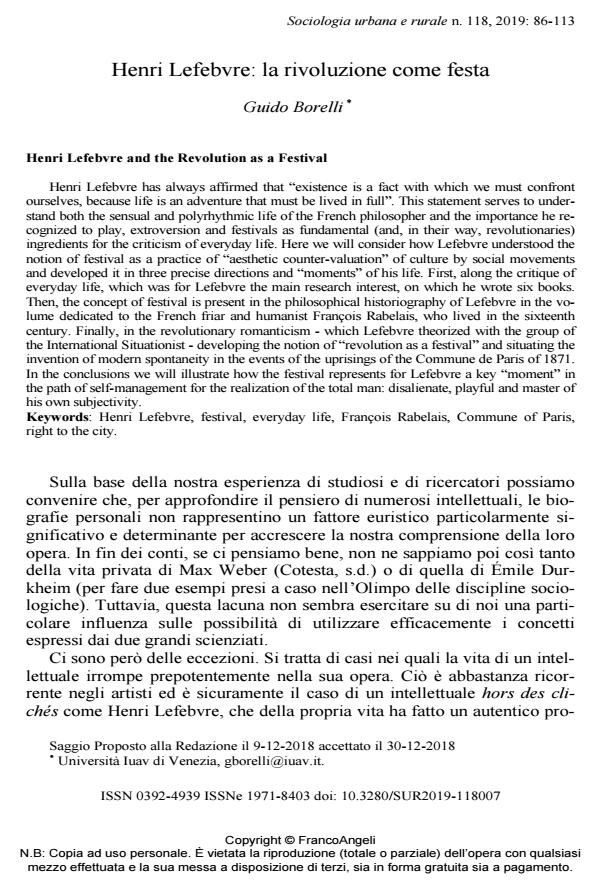Henri Lefebvre and the Revolution as a Festival
Journal title SOCIOLOGIA URBANA E RURALE
Author/s Guido Borelli
Publishing Year 2019 Issue 2019/118
Language Italian Pages 28 P. 86-113 File size 447 KB
DOI 10.3280/SUR2019-118007
DOI is like a bar code for intellectual property: to have more infomation
click here
Below, you can see the article first page
If you want to buy this article in PDF format, you can do it, following the instructions to buy download credits

FrancoAngeli is member of Publishers International Linking Association, Inc (PILA), a not-for-profit association which run the CrossRef service enabling links to and from online scholarly content.
Henri Lefebvre has always affirmed that "existence is a fact with which we must confront ourselves, because life is an adventure that must be lived in full". This statement serves to un-derstand both the sensual and polyrhythmic life of the French philosopher and the importance he recognized to play, extroversion and festivals as fundamental (and, in their way, revolutio-naries) ingredients for the criticism of everyday life. Here we will consider how Lefebvre un-derstood the notion of festival as a practice of "aesthetic counter-valuation" of culture by social movements and developed it in three precise directions and "moments" of his life. First, along the critique of everyday life, which was for Lefebvre the main research interest, on which he wrote six books. Then, the concept of festival is present in the philosophical historiography of Lefebvre in the volume dedicated to the French friar and humanist François Rabelais, who li-ved in the sixteenth century. Finally, in the revolutionary romanticism - which Lefebvre theo-rized with the group of the International Situationist - developing the notion of "revolution as a festival" and situating the invention of modern spontaneity in the events of the uprisings of the Commune de Paris of 1871. In the conclusions we will illustrate how the festival represents for Lefebvre a key "moment" in the path of self-management for the realization of the total man: disalienate, playful and master of his own subjectivity.
Keywords: Henri Lefebvre, festival, everyday life, François Rabelais, Commune of Paris, right to the city.
- Critique of everyday life of the night: Young people's re-appropriation of Turin's eveningificated nightlife Enrico Petrilli, Francesco Biagi, in Cities 105402/2024 pp.105402
DOI: 10.1016/j.cities.2024.105402 - Claiming the City through the Cape Verdean Festivities of Kola San Jon in Lisbon: A Lefebvrian Case Study Júlia Carolino, Francesco Biagi, in International Critical Thought /2022 pp.133
DOI: 10.1080/21598282.2021.2024765
Guido Borelli, Henri Lefebvre: la rivoluzione come festa in "SOCIOLOGIA URBANA E RURALE" 118/2019, pp 86-113, DOI: 10.3280/SUR2019-118007